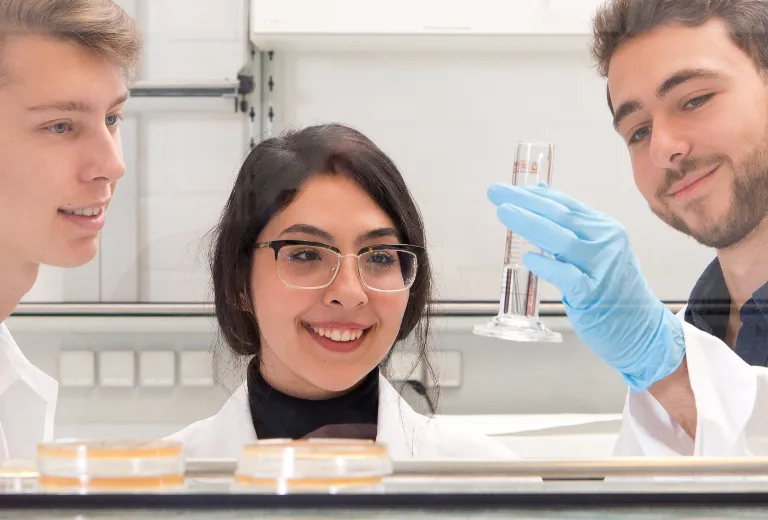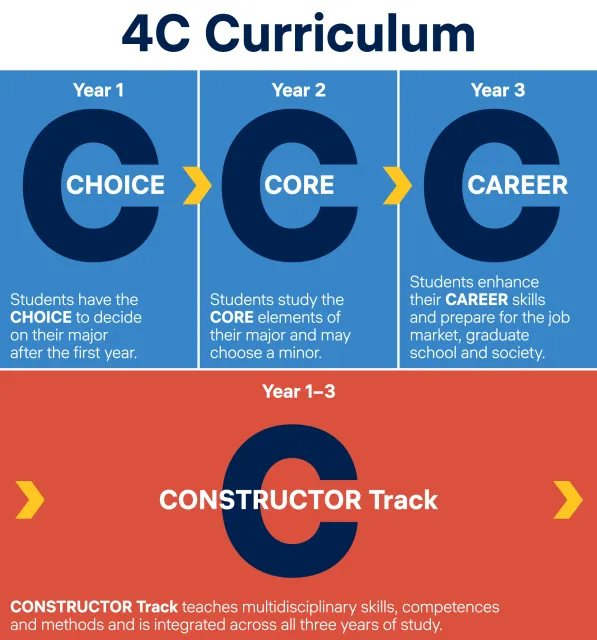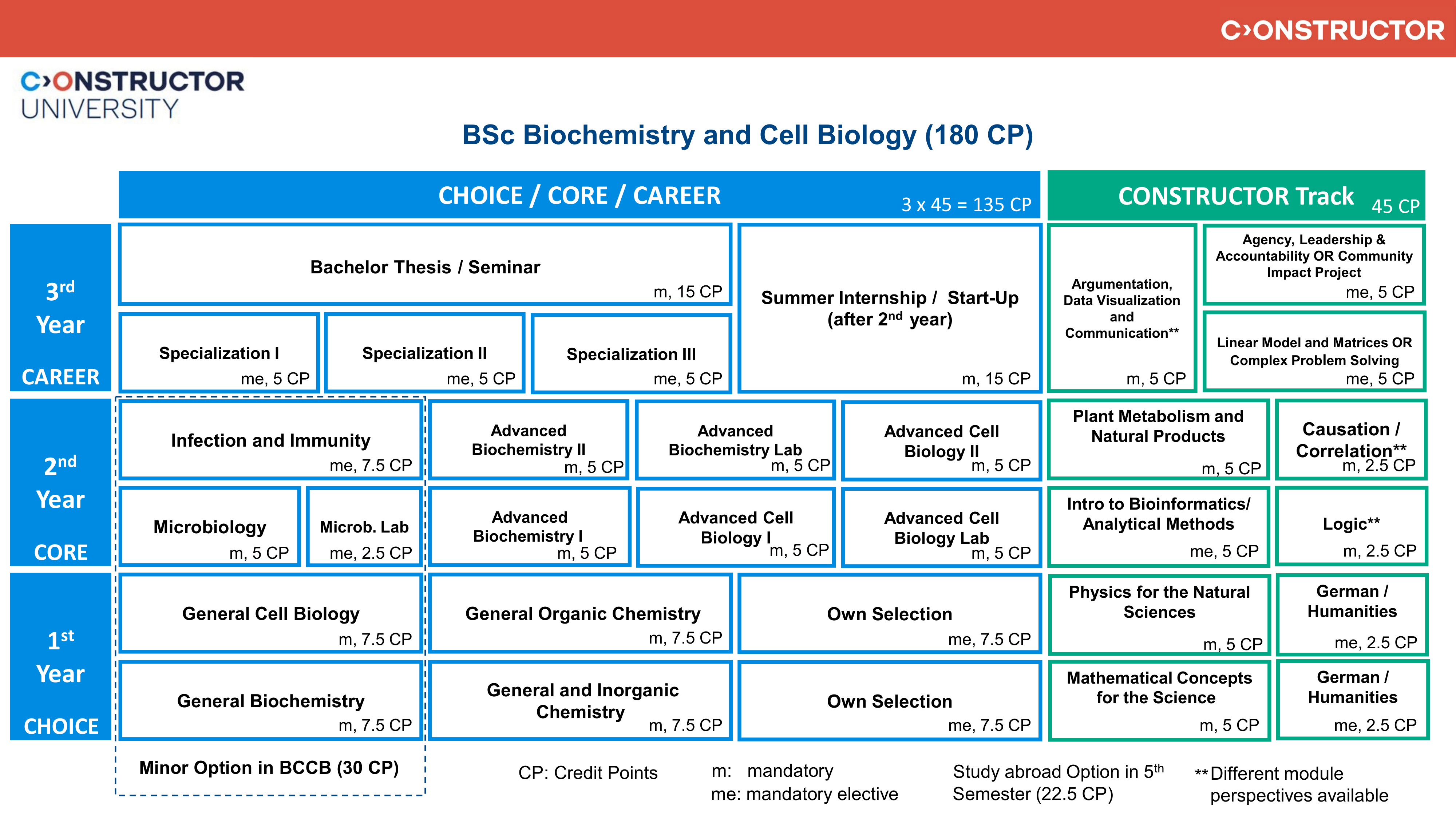

Biochemistry and Cell Biology
Biochemistry and Cell BiologyThis study program belongs to the School of Science
Location: On Campus
Biochemistry is the study of molecules and chemical processes in living organisms, while Cell Biology is concerned with the structure and physiology of cells, their components, and interactions with the environment. The two fields are combined in one comprehensive, English-taught degree program, which will give you a broad understanding of the molecular and cellular mechanisms that form the basis of life, including the principles of inheritance and gene expression. This allows BCCB graduates to address in their careers important problems in today's society, be it by basic or by applied research, for example in the areas of biomedicine, biotechnology, or molecular biology. For this, the BCCB program at Constructor University provides not only the theoretical background, but also substantial practical training. Students are, furthermore, involved in hands-on research during their studies.
The program is regularly highly ranked in the CHE Rankings and U-Multirank.
The undergraduate program at Constructor University is a three-year, 180-credit-point program designed to prepare students for a wide range of career paths.
The “4C Model” is the program's backbone, with disciplinary content grouped into three themes according to study years: CHOICE-CORE-CAREER. Additionally, the “CONSTRUCTOR Track”, an integral part of the program, runs parallel throughout the program. It provides students with multidisciplinary content and essential skills such as argumentation, data visualization, societal engagement, and communication.
The curriculum allows students to tailor their education to their goals and to explore different fields of study, with the flexibility to change their major within the first year. Moreover, the programs include a mandatory internship and a study-abroad opportunity in the fifth semester to provide students with hands-on experience and a global perspective.

The first study year is characterized by a broad offer in disciplinary education that builds on and extends the students’ entrance qualification. BCCB Students select introductory modules with a total of 45 CP from the CHOICE area of a variety of study programs, of which 30 CP will be from their intended major.
Students can still change to another major at the beginning of the second year of studies if they have taken the corresponding modules of the study program in the first year of studies.
Biochemistry and Cell Biology students take the following discipline-specific CHOICE Modules in their first year of study:
- CHOICE Module: General Biochemistry (7.5 CP)
- CHOICE Module: General and Inorganic Chemistry (7.5 CP)
- CHOICE Module: General Cell Biology (7.5 CP)
- CHOICE Module: General Organic Chemistry (7.5 CP)
The modules of the BCCB major are planned out to consist of integrated lecture and laboratory course module components. The General Biochemistry Module will explain how to apply and analyze basic concepts of biochemistry, while the General Cell Biology Module introduces students to cells that are the minimal functional units of life. Both BCCB-specific modules find their essential foundations and complementation in the General and Inorganic Chemistry and General Organic Chemistry Modules, in which the underlying principles of chemical reactions and organic molecules are conveyed. Thus, the macromolecular composition of cells, general principles of cellular and biochemical processes ,as well as molecular biological codes provided by the genome, the transcriptome and the proteome will be in the focus of the complementary components of the BCCB modules at large. Physiology and pathological alterations bringing about diseases will be introduced alongside. In-lab experiences will encompass documentation, description and discussion of experimental data, while awareness and following of safety rules and regulations are explained and trained.
In their second year, students take modules with a total of 45 CP from in-depth, discipline-specific CORE modules. These modules aim to extend the students’ critical understanding of the key theories, principles, and methods in their major at the current state of knowledge and best practice.
BCCB students take the following CORE modules:
- CORE Module: Advanced Biochemistry I (5 CP)
- CORE Module: Advanced Biochemistry II (5 CP)
- CORE Module: Advanced Biochemistry Lab (5 CP)
- CORE Module: Advanced Cell Biology I (5 CP)
- CORE Module: Advanced Cell Biology II (5 CP)
- CORE Module: Advanced Cell Biology Lab (5 CP)
- CORE Module: Microbiology (5 CP)
The mandatory CORE Modules of the BCCB program build on the BCCB CHOICE modules and are thought to deepen the knowledge in each of the two core fields of this major: biochemistry and cell biology. For either field, the CORE modules encompass two lectures and a laboratory course. To account for the wealth of information and the fast development in knowledge acquisition, as well as methodological advances in these rapidly enhancing scientific fields, the modules are staggered from the third to the fourth semester. The "Advanced Biochemistry I/II" modules cover energy production by living organisms, synthesis and degradation of biomolecules and principles of metabolism. Moreover, they address how genetic information is regulated, controlled and expressed in pro- and eukaryotic cells, and how DNA repair is realized at an advanced level. The "Advanced Cell Biology I/II" modules provide an in-depth view on the complexity of cellular systems, the regulation of key cellular processes and their integration in tissue formation and organismal organization, including regulatory mechanisms that allow for coordinated early development in selected model organisms. These modules will also address principles of genetics and evolution and discuss consequences of alterations upon loss of homeostasis or stress, thereby approaching biomedical implications leading to disease.
In the laboratory modules, students will perform experiments to elucidate the relationship between structure, biochemical properties, and activity of biomolecules, both in vitro and in a cellular context. For example, proteins tagged by the green fluorescent protein (GFP) will be expressed and biochemically characterized in the Advanced Biochemistry Laboratory module while protein trafficking and functioning in different cellular compartments will be analyzed using GFP-tagged proteins in combination with different targeting signals in the Advanced Cell Biology Laboratory module. Methods range from standard techniques like chromatography, gel electrophoresis, spectrophotometry to genetic engineering of plasmid vectors, the genetic manipulation of cells and advanced laser scanning microscopy. Result documentation, analysis and discussion will be accomplished through publication-style laboratory reports.
Students decide to complement their studies by taking the discipline-specific mandatory elective CORE modules (10 CP):
- CORE Module: Microbiology Lab (2.5 CP)
- CORE Module: Infection and Immunity (7.5)
Or substitute these modules with CORE modules from a second field of studies according to interest with the aim to pursue a minor.
In the "Microbiology Lab", students will identify environmental bacteria through biochemical and sequence analyses. The lecture module "Infection and Immunity" explores microbial biology and pathogenicity as well as host-pathogen interactions in light of the human immune system as an efficient defense mechanism.
During their third year, students prepare and make decisions for their career after graduation. To explore available choices fitting individual interests, and to gain professional experience, students take a mandatory summer internship.
The 5th semester opens also a mobility window for study abroad options. Finally, the 6th semester is dedicated to fostering the research experience of students by involving them in an extended Bachelor thesis and seminar module, which aims at data generation of publication quality.
In the third year of their studies, students take 15 CP from major-specific or major-related, advanced Specialization Modules to consolidate their knowledge and to be exposed to state-of-the-art research in the areas of their interest.
To pursue BCCB as a major, at least 10 of the 15 CP from the following major-specific Specialization Modules need to be taken:
- BCCB Specialization: Experimental Strategy Design (me, 5 CP)
- BCCB Specialization: Biomedicine (me, 5 CP)
- BCCB Specialization: Current Topics in the Molecular Life Sciences (me, 5 CP)
A maximum of 5 CP can be taken from major-related modules instead of major-specific Specialization Modules:
- CBT Specialization: Environmental Microbiology and Biotechnology (me, 5 CP)
- CBT CORE Module: Industrial Biotechnology (me, 5 CP)
- CBT CORE Module: Scientific Software and Databases (me, 5 CP)
- MCCB Specialization: Synthetic Biology (me, 5 CP)
- MCCB Specialization: Drug Discovery (me, 2.5 CP)
- MCCB CORE Module: Chemical Biology (me, 5 CP)
- ISCP CORE Module: Neurobiology of Behavior (me, 5 CP)
- ISCP CORE Module: Neuroscience Methods (me, 5 CP)
Students may also select 15 CP entirely from their major-specific Specialization Modules.
The specialization modules in the BCCB program aim at critical discussions and evaluations of current advances in different research fields of the molecular life sciences to unravel and apply the fascinating complexity of biological systems in basic and applied sciences. Although from different perspectives, the BCCB Specialization Modules will address scientific challenges in the 21st century and how scientists tackle them. The module contents will enable students to formulate hypotheses, develop a strategy to approach any research question experimentally, predict possible experimental outcomes, and how the experiments need to be controlled in order to finally draw a conclusion from their own data or the results of others. In this context, the regulatory frameworks governing activities in the bioscience field will be discussed and the principles for creating and realizing research projects in the fast progressing fields of life sciences will be outlined. The module contents will take into consideration the societal context in a world with increasing cultural and socio-economic diversity, for example, by critically deducing today’s challenges in designing research projects in the basic sciences and also by aiming at translation in the clinics.
Hypothesis-driven research is the central element in "Experimental Strategy Design," where students will expand their methodological knowledge through literature analysis, assessing the benefits and limitations of state-of-the art-techniques, which will enable them to eventually design their own research strategy to answer a given scientific question. The "Biomedicine" module will analyze how biological processes can go wrong in disease, which molecular regulators are targeted in designing therapeutic approaches and new treatment options, and how diagnostic tools can be developed. In "Current Topics," students will analyze recent scientific articles in a seminar-style format where students present the authors' rationale and experimental design and debate the experimental outcomes through in-class discussions.
As a core element of Constructor University’s employability approach students are required to engage in a mandatory two-month internship of 15 CP that will usually be completed during the summer between the second and third year of study. This gives students the opportunity to gain first-hand practical experience in a professional environment, apply their knowledge and understanding to a professional context, reflect on the relevance of their major in employment and society, reflect on their own role in employment and society, and find professional orientation. As an alternative to the full-time internship, students interested in setting up their own company can apply for a start-up option to focus on the development of their business plan.
The CONSTRUCTOR Track is another important feature of Constructor University’s educational model. The Constructor Track runs orthogonal to the disciplinary CHOICE, CORE, and CAREER modules across all study years and is an integral part of all undergraduate study programs. It provides an intellectual tool kit for lifelong learning and encourages the use of diverse methodologies to approach cross-disciplinary problems. The CONSTRUCTOR track contains Methods, New Skills and German Language and Humanities modules.
Methods
Methods and skills such as mathematics, statistics, programming, data handling, presentation skills, academic writing, and scientific and experimental skills are offered to all students as part of the Methods area in their curriculum. The modules that are specifically assigned to each study programs equip students with transferable academic skills. They convey and practice specific methods that are indispensable for each students’ chosen study program. Students are required to take 20 CP in the Methods area. The size of all Methods modules is 5 CP.
To pursue BCCB as a major, the following Methods modules (15 CP) need to be taken as mandatory modules:
- Methods Module: Mathematical Concepts for the Sciences (m, 5 CP)
- Methods Module: Physics for the Natural Sciences (m, 5 CP)
- Methods Module: Plant Metabolism and Natural Products (m, 5 CP)
Furthermore, students must choose either
- Methods Module: Introduction to Bioinformatics (me, 5 CP) or
- Methods Module: Analytical Methods (me, 5 CP, Semester 3)
New Skills Modules
This part of the curriculum constitutes an intellectual and conceptual tool kit that cultivates the capacity for a particular set of intellectual dispositions including curiosity, imagination, critical thought, and transferability. It nurtures a range of individual and societal capacities, such as self-reflection, argumentation and communication. Finally, it introduces students to the normative aspects of inquiry and research, including the norms governing sourcing, sharing, withholding materials and research results as well as others governing the responsibilities of expertise as well as the professional point of view. Students in this study program are required to take the following modules in their second and third year:
- New Skills Module: Logic (m, 2.5 CP)
- New Skills Module: Causation and Correlation (m, 2.5 CP)
- New Skills Module: Argumentation, Data Visualization and Communication (m, 5 CP)
Furthermore, they must choose either
- New Skills Module: Linear Model/Matrices (me, 5 CP) or
- New Skills Module: Complex Problem Solving (me, 5 CP)
as well one of the following modules:
- New Skills Module: Agency, Leadership and Accountability (me, 5 CP) or
- New Skills Module: Community Impact Project (me, 5 CP).
German Language and Humanities Modules
German language abilities foster students’ intercultural awareness and enhance their employability in their host country. They are also beneficial for securing mandatory internships (between the 2nd and 3rd year) in German companies and academic institutions. Constructor University supports its students in acquiring basic as well as advanced German skills in the first year of the Constructor Track. Non-native speakers of German are encouraged to take 2 German modules (2.5 CP each), but are not obliged to do so. Native speakers and other students not taking advantage of this offering take alternative modules in Humanities in each of the first two semesters.
The curriculum of the study program is outlined in the schematic study plan:

All study programs at Constructor University are accredited by the German Accreditation Council, guaranteeing adherence to high academic quality and international standards. This accreditation confirms that each program meets formal and subject-related criteria in terms of content, structure, and intended learning outcomes.
Join Constructor University in 5 easy steps:
- Complete your application
- Receive your decision after 3-4 weeks
- Learn about financing options
- Enroll and pay your deposit
- Settle in during O-Week and start your studies


Discover all the information you need about our fees and financing options for Constructor students. Our dedicated Student Financial Service Team will assist you in finding the best financial solution that will enable you to pursue your desired program and create a successful career path.
Cost of attendance 2025 / 2026
The direct costs of attendance include tuition, room and board, and fees, as outlined below.
The majority of BCCB graduates pursue advanced education. Past alumni of the program have been accepted into highly esteemed universities across the globe, including Imperial College London, LMU Munich, University of Heidelberg, University of Göttingen, ETH Zurich, EPF Lausanne, European Molecular Biology Laboratories (EMBL), various International Max Planck Research Schools (IMPRS), University of Oxford, University of Cambridge, Cornell University, Duke University, New York University, Yale, MIT, and Harvard University for their MSc and Ph.D. programs.
In addition to graduate education, the hands-on curriculum of the BCCB program, including numerous laboratory courses, prepares graduates for careers in the biotech, food, and pharmaceutical industries, as well as government agencies. Graduates can find employment as lab researchers in research-related positions, product development, technical support, marketing, or sales. Some alumni have also found success in non-traditional careers such as management, science policy, or science writing. Outside of academia, past BCCB graduates have secured positions at companies like Arthrex, Catenion, Roche, Leroy Merlin, Boston Consulting Group, and the non-profit Medicines for Malaria Venture.


Prof. Dr. Matthias Ullrich
Professor of Microbiology Life Sciences & Chemistry
Campus Ring 6
28759 Bremen
Germany
Tel: +49 421 200-3245
Fax: +49 421 200-3249
Email: m.ullrich@jacobs-university.de
Office: Research II, Room 60
This study program is part of the School of Science.
The School of Science focuses on multidisciplinary research and teaching to enhance the quality of life, health, and longevity through science and technology. Different approaches are used to study novel bioactive substances and functional materials at the molecular and nanoscale as well as to advance quantum technologies and exploit resources and energy in a sustainable manner.
Key disciplines in the school include Physics, Biochemistry, Biotechnology, Cell Biology, Chemistry, and Earth Sciences.


Become part of a global community
Constructor University Students come from all over the world to live and learn at Constructor University. Our student body represents 120 nations. They form an ambitious campus community whose internationality is unprecedented in Europe. Constructor University’s green and tree-shaded 80-acre campus provides much more than buildings for teaching and research.

Call us or write us – we are happy to help you with your inquiry.
Phone: 0421 200 4200
Email: study@constructor.university



